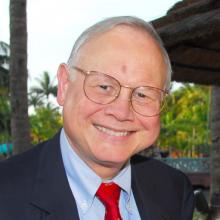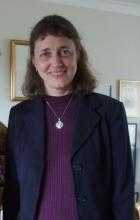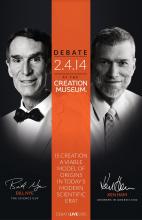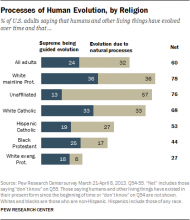Science

Rob Bell is on the move. In his “Everything is Spiritual” tour, which makes its way through the Washington, D.C., metro this evening, he is focusing on the connections between science and spirituality and how we can sit within the reality of our ever-expanding universe. Sojourners’ Catherine Woodiwiss spoke with the author and speaker to talk spirituality, the “nones,” Oprah, science, and surfing.
This interview has been edited for length and clarity.

John M. Templeton, Jr., a pediatric surgeon who left medicine behind to carry on his father’s passion for pursuing “new spiritual information” through the sciences as president and chairman of the Templeton Foundation, has died. He was 75.
Known as “Jack,” the younger Templeton retired as director of the trauma program at the Children’s Hospital of Philadelphia in 1995 to take the foundation reins and became chairman after his father’s death in 2008.

America is a nation established on certain inalienable rights. The right to life. The right to liberty. The right to pursue happiness as one sees fit. The right, as a religious organization, to sue a government and its officials whenever you don’t get what you want.
You may not remember that last one from social studies class — and to be honest, I don’t recall Jefferson expounding upon it, either — but it is nevertheless a right the fundamentalist group Answers in Genesis and its president, Ken Ham, availed themselves of last week with the announcement of their forthcoming lawsuit against the state of Kentucky, its governor, and its tourism secretary.
The kerfuffle is over AiG’s Ark Encounter — the “creationist theme park” complete with a 510-foot wooden replica of Noah’s floating barn (except this one won’t float, plus it costs 70 million bucks) — and specifically, the $18 million in special tax incentives the Commonwealth’s tourism department had initially approved in 2011 before retracting them last year.
The goal of the incentives is to promote the construction of job-creating tourist attractions in Kentucky, and AiG’s project initially held water. What caused it to fall out of favor with the Bluegrass State was the group’s increasingly vocal insistence that it intended to: 1) require its employees to sign a statement of faith affirming, among other things, their devotion to the idea that the universe was created sometime more recently than the invention of beer by the Mesopotamians, and 2) operate the park pretty much like its Creation Museum — i.e., as evangelistic outreach.

Meet the “Post-Seculars” — the one in five Americans who no one seems to have noticed before in endless rounds of debates pitting science vs. religion.
They’re more strongly religious than most “Traditionals” (43 percent of Americans) and more scientifically knowledgeable than “Moderns” (36 percent) who stand on science alone, according to two sociologists’ findings in a new study.
“We were surprised to find this pretty big group (21 percent) who are pretty knowledgeable and appreciative about science and technology but who are also very religious and who reject certain scientific theories,” said Timothy O’Brien, co-author of the research study, released Jan. 29 in the American Sociological Review.
Put another way, there’s a sizable chunk of Americans out there who are both religious and scientifically minded but who break with both packs when faith and science collide.

Responding to a real or perceived gap between science and faith, 10 U.S. seminaries will receive a combined $1.5 million in grants to include science in their curricula, the American Association for the Advancement of Science announced Oct. 8.
A diverse set of Christian seminaries will be awarded grants ranging from $90,000 to $200,000 provided by the John Templeton Foundation, which has funded various efforts to bridge science and faith, including $3.75 million to AAAS for the project.
“Many (religious leaders) don’t get a lot of science in their training and yet they become the authority figures that many people in society look up to for advice for all kinds of things, including issues related to science and technology,” said Jennifer Wiseman, director of the AAAS Dialogue on Science, Ethics and Religion.
Indeed, evangelical Protestants are more than twice as likely as other Americans to say they would turn to a religious text, a religious leader or people at their congregation if they had a question about science, a study released by AAAS earlier this year suggested.
Colloquially known as the “Monkey Trial,” the Tennessee v. John Scopes trial ended on July 21, 1925, but 89 years later, the American public is still debating on where it stands with religion and science education.
John Scopes, a public school teacher, was charged by the state for teaching evolution because one of its laws prohibited any public school curricula that contradicted creationism. The trial began on July 10, 1925, and Scopes pled not guilty. Along with other members of the community, Scopes had planned the curriculum as a publicity stunt.
Eighty-nine years ago today, Scopes was found guilty and sentenced to pay a $100 fine — an estimated $1,300, when adjusted for inflation.

AS THIS IS written, the big, fat Hollywood blockbuster Noah is opening amid condemnation from some Muslims and evangelical Christians and praise from most film critics.
Today, any product that touches the Bible is bound to be perceived as another entry in the culture wars. But that doesn’t seem to be what the producers and filmmakers had in mind with Noah. After all, it’s time-tested public domain material that presents great opportunities for computer-generated imagery (CGI) special effects. Paramount, the studio that put up the $125 million production cost, mostly wanted to peel off a slice of the Christian audience that flocked to Mel Gibson’s The Passion of the Christ and the History Channel’s Bible series.
But Noah was a culture war surrogate long before Russell Crowe donned his biblical robes. That’s because the creationist organization Answers in Genesis (AiG), which runs an anti-evolution Creation Museum in northern Kentucky, has for the past few years been trying to raise money to build a theme park anchored by a Bible-sized replica of Noah’s Ark. The Creation Museum is famous for such attractions as exhibits that depict humans and dinosaurs as neighbors. You may have heard it described as the museum for people who think The Flintstones was reality TV.
It’s a big job rebuilding Noah’s ark. The makers of the movie Noah only built to about a third of the biblical dimensions and used CGI for the rest. The price tag for the one planned in Kentucky is about $73 million. Early on, the project got a surprising boost from Kentucky’s governor, Democrat Steve Beshear. You may have seen Beshear on TV recently hyping Kentucky’s rollout of the Affordable Care Act. But before that, in 2010, Beshear came in for rounds of derision when he announced that our state would give $37 million in tax breaks to the ark attraction, as an economic development measure. When—or if—completed, the park is supposed to create 900 jobs and bring $250 million into Kentucky in its first five years.

The end of the Gospel of Mark is, shall we say, indecisive. Mark’s account of the resurrection begins with the women going to anoint Jesus’ body and discovering the stone rolled away, Jesus’ body gone missing, and “a young man, dressed in a white robe” sitting in the tomb. This man tells them not to be alarmed, as if that’s possible under the circumstances, and announces that Jesus “has been raised.” The young man instructs them to go and tell the disciples that Jesus will meet them in Galilee. Really? Our dead friend is arranging a meet-up via an angel-gram? I think I’d react the same way the women do in verse 8: “they said nothing to anyone, for they were afraid.”
Here is the note that appears in my NRSV Bible at the end of verse 8, which is followed by one more verse, the so-called “shorter ending of Mark:”
Some of the most ancient authorities bring the book to a close at the end of verse 8. One authority concludes the book with the shorter ending; others include the shorter ending and then continue with verses 9-20. In most authorities verses 9-20 follow immediately after verse 8, though in some of these authorities the passage is marked as being doubtful.
I’m doubtful, too, but not because no one seems to know how the Gospel writer wanted to end his Gospel. But because doubt seems to be the reaction du jour. In the longer ending, we find out that the women break their silence, but those who are “mourning and weeping” for Jesus “would not believe it.” Mark tells us Jesus appeared to “two of them, as they were walking in the country.” But when they “told the rest,” again “they did not believe them.” This is completely understandable because resurrection cannot be considered part of normal experience, no matter what century you are living in. And yet the witnesses to Jesus’ resurrection want us to believe in the reality of it, that Jesus appeared to them and they could experience his dead-yet-aliveness, normal human beings though they were.

Many viewers may be hoping that Cosmos: A Spacetime Odyssey lives up to the original series created by astronomer Carl Sagan 35 years ago.
But no one will watch the program, airing Sunday on Fox, with greater anticipation than nonbelievers — atheists, agnostics, humanists, and other “nones.”
Among this group, many credit Sagan and the original Cosmos with instilling in them skepticism of the supernatural and a sense of wonder about the universe. Both, they say, encouraged their rejection of institutional religion.
Humanists are especially eager. They claim Sagan as their own, and see in the Cosmos series — a multipart journey to the outer reaches of our universe — and in his dozen books a vibrant strain of their own philosophy. That philosophy favors reason over religion and holds human beings as both good and responsible for the Earth’s plight.


Scientists and Christian evangelicals can collaborate for the good of society but it will take some serious effort, experts said as they launched a new campaign to change perceptions between the two groups.
The American Association for the Advancement of Science and its Dialogue on Science, Ethics, and Religion program released a major research project on Sunday, at the AAAS annual meeting in Chicago, and announced an upcoming series of conferences mixing believers, scientists, and many who are both.
The massive survey of views on God, religion, science included 10,241 respondents and took a particularly close look at the views of evangelicals and people in science-related occupations.

Whenever I hear about someone else making a case for Young Earth Creationism in the name of Christianity, I’m embarrassed, once again, to associate myself with them. And people wonder why many of us prefer to identify as “Jesus followers” or “Spiritual but not Religious” rather than be lumped in with the Ken Hams of the world.
Duh.
The thing is, a healthy number of us who consider ourselves to be Christian embrace science. We think critically. We accept the likelihood that much we think we understand about the world, the universe, and about our faith can (and should) change as we learn new things. We understand that faith is more about questions than answers, and that the prime mover in our faith practice is to be more like Jesus in our own daily walk, rather than focusing so much on making others more like us.
The desire of a vocal minority (yes, that’s what I said, and I meant it) of Christians to cling to a notion that the entire universe is a few thousand years old, despite the clear physical evidence to the contrary, points less to a reasonable alternate view of the observable world. Rather, it points to a desperate attempt to maintain a dying voice in the cultural conversation.

IN 2013, Sojourners commissioned a messaging study to contribute to the creation care movement—the Christian response to climate change. We polled nearly 1,100 people, oversampling for evangelical Christians, since evangelicals can be politically effective when activated on justice issues, as they have been on immigration, HIV/AIDS, and human trafficking.
Our goal was not only to learn evangelicals’ attitudes about climate change, but also to explore which messages are most compelling so we can better communicate on the issue and make an effective difference for God’s creation.
The first thing we learned was that many of the common stereotypes about evangelicals and climate change simply aren’t true. For one thing, the majority of evangelicals we surveyed (60 percent) agree that climate change is happening, and most say that human activity plays a role.
Second, one’s position on climate change is better predicted by political affiliation than by religion but, interestingly, evangelical Republicans are more likely to support action on climate change than non-evangelical Republicans. Young evangelicals are also more receptive to climate change messages than non-evangelical young people. And for those who don’t agree with us on climate change, there is a low level of certainty: Twenty-five percent of evangelicals are in the moveable middle, either “somewhat sure” that climate change isn’t happening or undecided. This means there’s a good chance that they already care, or that their opinion could be changed.

Bill Nye may be “The Science Guy,” but Ken Ham is the “Answers in Genesis” man, and a debate between the two over the origins of life has nonbelievers and Christians wringing their hands.
Nye, host of a beloved television science series, and Ham, president of a creationist apologetics ministry, will meet at the Creation Museum, where Ham is also the president, on Feb. 4. In what some wags are calling “the Ham-on-Nye debate,” they will weigh this question: “Is creation a viable model of origins?”
In truth, both sides answered that question long ago — Nye with Charles Darwin’s work on the origin of species and Ham with the first book of the Bible. Yet many observers — both religious and nonreligious — say the debate is a very bad idea.

AS A TEST subject in an ongoing medical study, I can report with confidence that, so far, I’m still alive—an important variable in research that measures the effect of Vitamin D and fish oil on heart health. At least, that’s the stated purpose. But, after taking the pills every day for two years of the five-year study, I’m thinking there may be something else going on.
It’s called a “vital study,” and it’s being run by the Harvard Medical School, a prestigious institution that typically leaves your average research projects to lesser entities, such as the federal government. But this is a “vital study,” and if Harvard is involved it must be big, probably top secret. And it chose me for a reason (other than my awesome averageness, of course).
But why? I admit I’m an older white male, the main population for the study, but since our contact has been exclusively by email, how did Harvard know? Were they tipped off by my habit of Googling subjects like calcium retention, wrinkle removal, and the name of the woman on Gilligan’s Island who wasn’t the movie star. (Editor’s Note: Mary Ann.) Doh!
Perhaps Harvard used email as a clever ploy to mask the fact that they’ve been closely monitoring me for years, observing my selfless nature and noble commitment to the greater good, except when I’m driving. To Harvard, I must have seemed the ideal subject for a secret project to build a lean, mean, elderly fighting machine!

As evolution remains a contentious issue for many public schools, a new survey suggests that views on the question are driven by Americans’ religious affiliation more than their level of education.
Overall, six in 10 Americans say that humans have evolved over time, while one-third reject the idea of human evolution, according to a new analysis by the Pew Research Center. The one-third of Americans who reject human evolution has remained mostly unchanged since a 2009 Pew survey.
About one in four American adults say that “a supreme being guided the evolution of living things for the purpose of creating humans and other life in the form it exists today.”
While education matters, the new analysis suggests that religion appears to have more influence than level of education on evolution. The 21-point difference between college graduates and high school graduates who believe in evolution, for example, is less stark than the 49-point difference between mainline Protestants and evangelicals.

In a world where people are craving inspiration, growth, and information, many churches maintain a cyclical pattern based on redundancy, safety, and closed-mindedness. Unfortunately, many pastors and Christian leaders continue to recycle old spiritual clichés — and sermons — communicating scripture as if it were propaganda instead of life-changing news, and driving away a growing segment of people who find churches ignorant, intolerant, absurd, and irrelevant.
As technology continues to make news and data more accessible, pastors are often failing to realize that they're no longer portrayed as the respected platforms of spiritual authority that they once were.
Instead of embracing dialogue and discussion, many Christian leaders react to this power shift by creating defensive and authoritarian pedestals, where they self-rule and inflict punishment on anyone who disagrees, especially intellectuals.

Last week I found out about the unfolding cases of sexual harassment by a respected science blogger and the head of Scientific American’s blog, Bora Zivkovic. It shocked me because I’ve met the man, though I don’t know him well. And so I read the accounts of the three women science bloggers who exposed him. Thefirst one shocked me and made me angry. And the second one shocked me further, because she wrote of the harassment continuing at a conference I attended. It happened right under my nose.
Women are an important part of the science community, but there’s a group of powerful men who are gatekeepers, and some of them use this power as a tool to be overtly sexual with female bloggers looking to advance their writing careers in the science community. The allegations regarding Bora Zivkovic seem to be hard for many in the science community to swallow because he has been a vocal supporter of women’s importance in the field and has actively nurtured the careers of many bloggers.

Texas high school biology textbooks battles are once again in progress in Austin, with lines drawn between those who want textbook material based only on established mainstream science and those who are anti-science. As an evangelical Christian and a botany professor at Hardin-Simmons University in Abilene, Texas, I am all too familiar with the battle for scientific authenticity in our state’s textbooks.
The Texas State Board of Education (SBOE) wields an enormous influence over which textbooks are adopted by school districts in Texas. And because the Texas market for public school textbooks is one of the country’s largest, publishers use the curriculum and content from Texas books in those they print for the rest of the nation. For this reason, what happens in Texas doesn’t stay in Texas. This is why it is so important that we ensure that publishers produce books based on mainstream science.